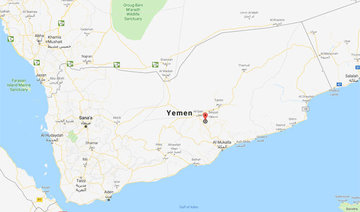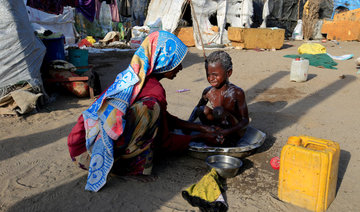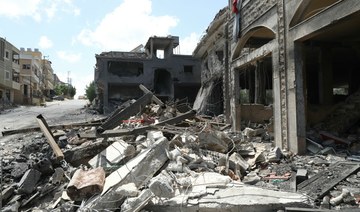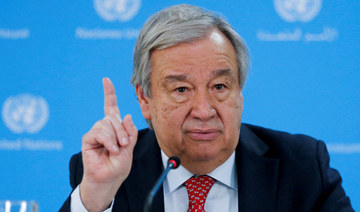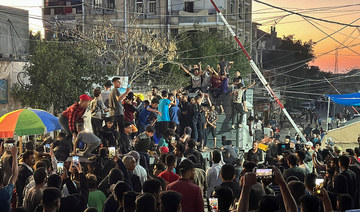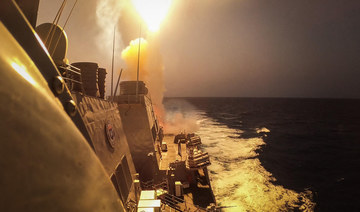DUBAI: The Saudi Arabian-led coalition in Yemen has handed 27 children to the Yemeni government after they were caught fighting with Houthi terrorist fighters on the border with the Kingdom, state news agency SPA reported.
An official coalition source said the Houthi militia were forcing Yemeni children to fight on the frontline.
The children were handed over at Sharourah force command in the presence of representatives from various organizations including members of the coalition forces, the International Committee of the Red Cross, the Saudi Red Crescent Authority, and the head of Child Protection Unit in Armed Conflict.
The children were transported by bus to Marib.
Arab coalition in Yemen hands over child-soldiers forced to fight by Houthi terrorists
Arab coalition in Yemen hands over child-soldiers forced to fight by Houthi terrorists
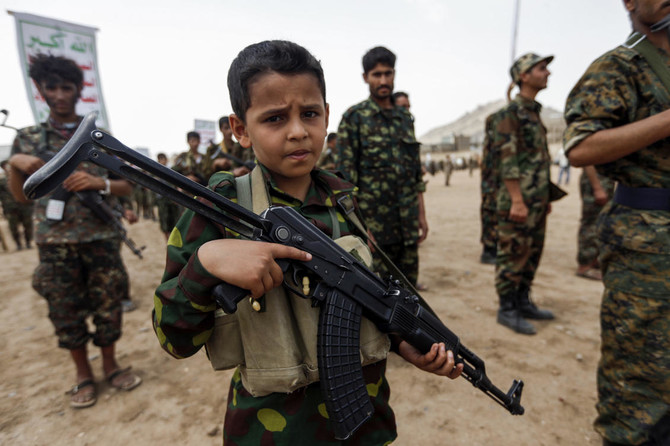
HRW: Israel attack on Lebanon rescuers was ‘unlawful’
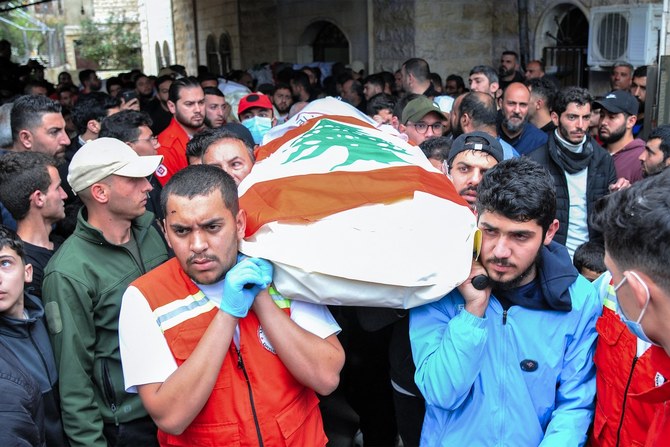
- The rights group urged the United States to “immediately suspend arms sales and military assistance to Israel
Beirut: Human Rights Watch said Tuesday an Israeli strike in Lebanon that killed seven first responders was “an unlawful attack on civilians,” and urged Washington to suspend weapons sales to Israel.
The Israel-Lebanon border area has witnessed near-daily exchanges between the Israeli army and Hamas ally Hezbollah since the Palestinian militant group attacked southern Israel on October 7 sparking war in Gaza.
“An Israeli strike on an emergency and relief center” in the southern village of Habariyeh on March 27 “killed seven emergency and relief volunteers” and constituted an “unlawful attack on civilians that failed to take all necessary precautions,” HRW said in a statement.
“If the attack on civilians was carried out intentionally or recklessly, it should be investigated as an apparent war crime,” it added.
The Israeli military did not immediately comment when contacted by AFP.
But at the time the military said the target was “a military compound” and that the strike killed a “significant terrorist operative” from Jamaa Islamiya, a Lebanese group close to Hamas, and other “terrorists.”
HRW said in the statement that it found “no evidence of a military target at the site,” and said the Israeli strike “targeted a residential structure that housed the Emergency and Relief Corps of the Lebanese Succour Association, a non-governmental humanitarian organization.”
Jamaa Islamiya later denied it was connected to the emergency responders, and the association told AFP it had no affiliation with any Lebanese political organization.
HRW said “the Israeli military’s admission” it had targeted the center in Habariyeh indicated a “failure to take all feasible precautions to verify that the target was military and avoid loss of civilian life... making the strike unlawful.”
The rights group said those killed were volunteers, adding that 18-year-old twin brothers were among the dead.
“Family members... the Lebanese Succour Association, and the civil defense all said that the seven men were civilians and not affiliated with any armed group,” it added.
However, it noted that social media content suggested at least two of those killed “may have been supporters” of Jamaa Islamiya.
HRW said images of weapons parts found at the site included the remains of an Israeli bomb and remnants of a “guidance kit produced by the US-based Boeing Company.”
“Israeli forces used a US weapon to conduct a strike that killed seven civilian relief workers in Lebanon who were merely doing their jobs,” HRW’s Lebanon researcher, Ramzi Kaiss, said.
The rights group urged the United States to “immediately suspend arms sales and military assistance to Israel given evidence that the Israeli military is using US weapons unlawfully.”
Israeli military take control of vital Rafah crossing from Gaza into Egypt
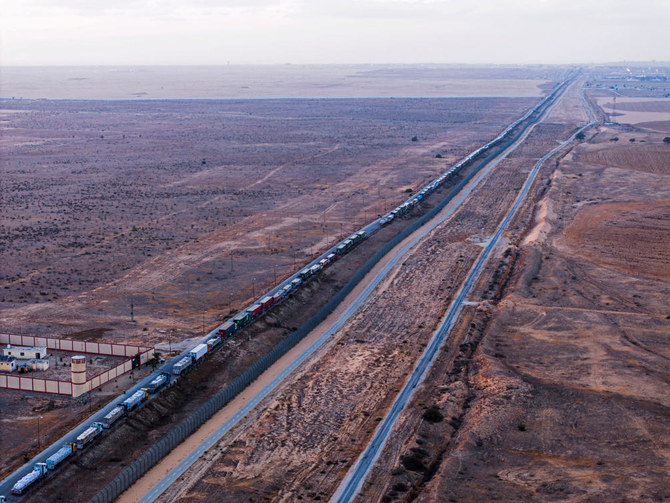
- Israel military takes control of Rafah crossing, special forces scanning area
- Israel says vast majority of people evacuated from military area
JERUSALEM: The Israeli military took control of the vital Rafah border crossing between Gaza and Egypt on Tuesday, pushing into the southern Gazan town after a night of air strikes and as prospects for a ceasefire deal hung in the balance.
The Palestinian militant group Hamas said late on Monday it had agreed to a ceasefire proposal from mediators seven months into the war that has pushed more than a million Gazans into the south of the enclave.
Israel said the terms did not meet its demands and launched a military operation in Rafah.
Israeli tanks and planes pounded several areas and houses in Rafah overnight, killing 20 Palestinians and wounding several others in strikes that hit at least four houses, Palestinian health officials said.
“The Israeli occupation has sentenced the residents of the Strip to death after closure of the Rafah border crossing,” said Hisham Edwan, spokesman for the Gaza Border Crossing Authority. It also condemned to death cancer patients due to the collapse of the health care system, he added.
Israel has been threatening to launch a major incursion in Rafah, which it says harbors thousands of Hamas fighters and potentially dozens of hostages. Victory is impossible without taking Rafah, it says.
Rafah crossing closed
A Gaza border authority spokesperson told Reuters the Rafah crossing, a major route for aid into the devastated enclave, was closed because of the presence of Israeli tanks. Israel’s Army Radio had earlier announced its forces were there.
The United States has been pressing Israel not to launch a military campaign in Rafah until it had drawn up a humanitarian plan for the Palestinians sheltering there, which Washington says it has yet to see.
Israel said the vast majority of people had been evacuated form the area of military operations.
Instructed by Arabic text messages, phone calls and flyers to move to what the Israeli military called an “expanded humanitarian zone” around 20 km (12 miles) away, some Palestinian families began trundling away in chilly spring rain.
Some piled children and possessions onto donkey carts, while others left by pick-up or on foot through muddy streets.
As families dismantled tents and folded belongings, Abdullah Al-Najar said this was the fourth time he had been displaced since the fighting began seven months ago.
“God knows where we will go now. We have not decided yet.”
Truce talks in Cairo
Hamas said in a brief statement that its chief, Ismail Haniyeh, had informed Qatari and Egyptian mediators the group accepted their proposal for a ceasefire.
Israeli Prime Minister Benjamin Netanyahu’s office said later the truce proposal fell short of Israel’s demands but Israel would send a delegation to meet with negotiators to try to reach an agreement.
Qatar’s foreign ministry said its delegation will head to Cairo on Tuesday to resume indirect negotiations between Israel and Hamas.
In a statement, Netanyahu’s office said his war cabinet approved continuing an operation in Rafah. Jordan’s Foreign Minister Ayman Safadi said on social media site X that Netanyahu was jeopardizing a ceasefire by bombing Rafah.
An Israeli official, speaking on condition of anonymity, said the proposal that Hamas approved was a watered-down version of an Egyptian offer and included elements Israel could not accept.
“This would appear to be a ruse intended to make Israel look like the side refusing a deal,” said the Israeli official.
Another official briefed on the agreement said Hamas had agreed to the phased ceasefire and hostage release deal Israel proposed on April 27 with only minor changes that did not affect the main parts of the proposal.
US State Department spokesman Matthew Miller said Washington would discuss the Hamas response with its allies in the coming hours, and a deal was “absolutely achievable.”
Any truce would be the first pause in fighting since a week-long ceasefire in November, during which Hamas freed around half of the hostages.
Since then, all efforts to reach a new truce have foundered over Hamas’ refusal to free more hostages without a promise of a permanent end to the conflict, and Israel’s insistence that it would discuss only a temporary pause.
More than 34,600 Palestinians have been killed in the conflict, according to Gaza health officials. The UN has said famine is imminent in the enclave.
The war began when Hamas militants attacked Israel on Oct. 7, killing about 1,200 people and abducting 252 others, of whom 133 are believed to remain in captivity in Gaza, according to Israeli tallies.
UKMTO receives report two explosions south of Yemen’s Aden
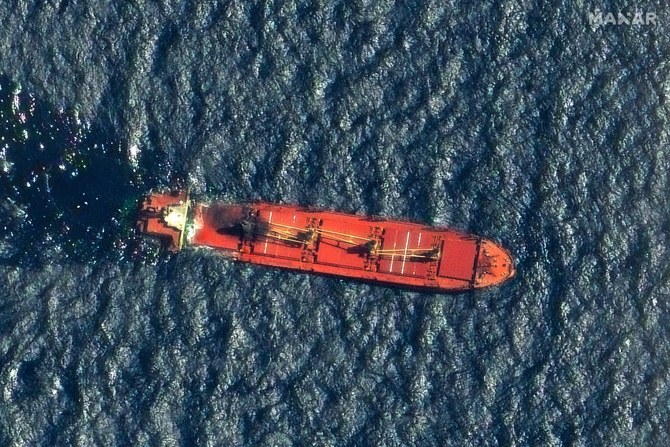
- The Houthi militia that controls the most populous parts of Yemen and is aligned with Iran have staged attacks on ships in the waters off the country for months
CAIRO: The United Kingdom Maritime Trade Operations (UKMTO) said on Tuesday two explosions were reported in the proximity of a merchant vessel 82 nautical miles south of Yemen’s Aden.
UKMTO reported that the vessel and all crew are safe and that authorities are investigating.
The Houthi militia that controls the most populous parts of Yemen and is aligned with Iran have staged attacks on ships in the waters off the country for months in solidarity with Palestinians fighting Israel in Gaza.
Authorities were investigating the incident, UKMTO said in an advisory note sent by email.
The Houthi militants have launched repeated drone and missile strikes in the Red Sea, Bab Al-Mandab Strait and Gulf of Aden since November.
That has forced shippers to re-route cargo on longer and more expensive journeys around southern Africa and stoking fears the Israel-Hamas war could spread and destabilize the Middle East.
Palestinians seek UN General Assembly backing for full membership

- Diplomats say 193-member General Assembly likely to back Palestinian bid
- Others say move could set precedent for others, citing Kosovo and Taiwan as examples
UNITED NATIONS: The United Nations General Assembly could vote on Friday on a draft resolution that would recognize the Palestinians as qualified to become a full UN member and recommend that the UN Security Council “reconsider the matter favorably.”
It would effectively act as a global survey of how much support the Palestinians have for their bid, which was vetoed in the UN Security Council last month by the United States. An application to become a full UN member needs to be approved by the 15-member Security Council and then the General Assembly.
Diplomats say the 193-member General Assembly is likely to back the Palestinian bid. But changes could still be made to the draft after some diplomats raised concerns with the current text, seen by Reuters, that also grants additional rights and privileges — short of full membership — to the Palestinians.
Some diplomats say this could set a precedent for other situations, citing Kosovo and Taiwan as examples.
Israel’s UN Ambassador Gilad Erdan on Monday denounced the current draft General Assembly resolution, saying it would give the Palestinians the de facto status and rights of a state and goes against the founding UN Charter.
“If it is approved, I expect the United States to completely stop funding the UN and its institutions, in accordance with American law,” said Erdan, adding that adoption by the General Assembly would not change anything on the ground.
US CONCERNS
Under US law, Washington cannot fund any UN organization that grants full membership to any group that does not have the “internationally recognized attributes” of statehood. The US halted funding in 2011 for the UN cultural agency (UNESCO)after the Palestinians became a full member.
“It remains the US view that the path toward statehood for the Palestinian people is through direct negotiations,” said Nate Evans, spokesperson for the US mission to the UN
“We are aware of the resolution and reiterate our concerns with any effort to extend certain benefits to entities when there are unresolved questions as to whether the Palestinians currently meet the criteria under the Charter,” he said.
The Palestinians are currently a non-member observer state, a de facto recognition of statehood that was granted by the UN General Assembly in 2012. The Palestinian mission to the UN in New York did not immediately respond to a request for comment on its push for action in the General Assembly.
The Palestinian push for full UN membership comes seven months into a war between Israel and Palestinian militants Hamas in the Gaza Strip, and as Israel is expanding settlements in the occupied West Bank, which the UN considers to be illegal. The United Nations has long endorsed a vision of two states living side by side within secure and recognized borders.
Palestinians want a state in the West Bank, east Jerusalem and Gaza Strip, all territory captured by Israel in 1967.
Palestinians seek UN General Assembly backing for full membership
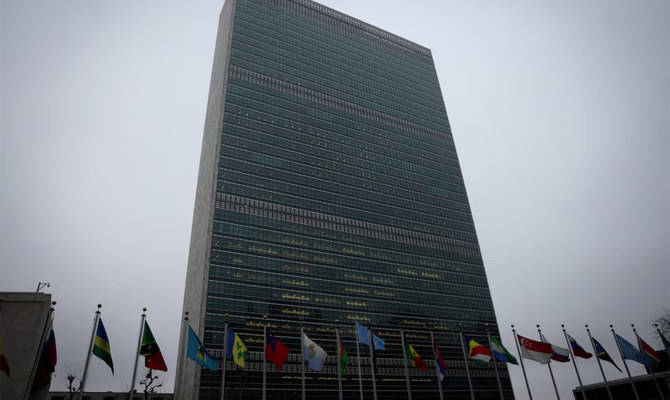
- Diplomats say the 193-member General Assembly is likely to back the Palestinian bid
UNITED NATIONS: The United Nations General Assembly could vote on Friday on a draft resolution that would recognize the Palestinians as qualified to become a full UN member and recommend that the UN Security Council “reconsider the matter favorably.”
It would effectively act as a global survey of how much support the Palestinians have for their bid, which was vetoed in the UN Security Council last month by the United States. An application to become a full UN member needs to be approved by the 15-member Security Council and then the General Assembly.
Diplomats say the 193-member General Assembly is likely to back the Palestinian bid. But changes could still be made to the draft after some diplomats raised concerns with the current text, seen by Reuters, that also grants additional rights and privileges — short of full membership — to the Palestinians.
Some diplomats say this could set a precedent for other situations, citing Kosovo and Taiwan as examples.
Israel’s UN Ambassador Gilad Erdan on Monday denounced the current draft General Assembly resolution, saying it would give the Palestinians the de facto status and rights of a state and goes against the founding UN Charter.
“If it is approved, I expect the United States to completely stop funding the UN and its institutions, in accordance with American law,” said Erdan, adding that adoption by the General Assembly would not change anything on the ground.
US CONCERNS
Under US law, Washington cannot fund any UN organization that grants full membership to any group that does not have the “internationally recognized attributes” of statehood. The US halted funding in 2011 for the UN cultural agency (UNESCO)after the Palestinians became a full member.
“It remains the US view that the path toward statehood for the Palestinian people is through direct negotiations,” said Nate Evans, spokesperson for the US mission to the UN
“We are aware of the resolution and reiterate our concerns with any effort to extend certain benefits to entities when there are unresolved questions as to whether the Palestinians currently meet the criteria under the Charter,” he said.
The Palestinians are currently a non-member observer state, a de facto recognition of statehood that was granted by the UN General Assembly in 2012. The Palestinian mission to the UN in New York did not immediately respond to a request for comment on its push for action in the General Assembly.
The Palestinian push for full UN membership comes seven months into a war between Israel and Palestinian militants Hamas in the Gaza Strip, and as Israel is expanding settlements in the occupied West Bank, which the UN considers to be illegal. The United Nations has long endorsed a vision of two states living side by side within secure and recognized borders. Palestinians want a state in the West Bank, east Jerusalem and Gaza Strip, all territory captured by Israel in 1967.


